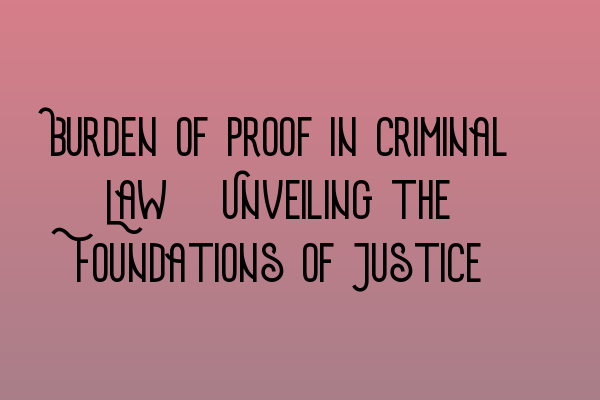Burden of Proof in Criminal Law: Unveiling the Foundations of Justice
Justice is the cornerstone of any legal system, and in criminal law, the burden of proof is a fundamental concept that ensures that this cornerstone remains intact. The burden of proof refers to the responsibility of the prosecution to prove the guilt of the defendant beyond a reasonable doubt. This principle is essential in guaranteeing fair trials and protecting the rights of the accused.
The Presumption of Innocence
One of the central tenets of criminal law is the presumption of innocence. This means that every individual is considered innocent until proven guilty. The burden of proof rests solely on the prosecution to present evidence that is sufficient to convince the judge or jury of the defendant’s guilt.
The presumption of innocence ensures that individuals are not unjustly convicted or subjected to punishment without concrete evidence. It places the onus on the prosecution to gather and present compelling evidence to establish guilt, leaving no room for mere speculation or conjecture.
Beyond a Reasonable Doubt
The burden of proof in criminal law requires the prosecution to prove the defendant’s guilt beyond a reasonable doubt. This standard of proof is significantly higher than the standard used in civil cases. Beyond a reasonable doubt means that there should be no plausible or logical doubt in the minds of the judge or jury regarding the defendant’s guilt.
The high standard of proof reflects the serious consequences that a criminal conviction can have on an individual’s life, liberty, and reputation. It aims to prevent wrongful convictions and protect individuals from being punished based on insufficient or unreliable evidence.
Relevance of the Burden of Proof
The burden of proof is an indispensable aspect of the criminal justice system. It serves several crucial purposes:
- Ensuring fair trials: By placing the responsibility on the prosecution to prove guilt, the burden of proof guarantees that individuals are afforded a fair trial where evidence is thoroughly examined.
- Safeguarding the rights of the accused: The burden of proof protects the rights of the accused by requiring the prosecution to meet a high standard of proof before a conviction can be secured. This prevents arbitrary or baseless charges.
- Encouraging thorough investigations: The burden of proof compels the prosecution to conduct a comprehensive investigation and gather strong evidence. This promotes the search for truth and helps prevent wrongful convictions.
- Maintaining public confidence: A robust burden of proof instills public confidence in the criminal justice system. It demonstrates that the system is fair and impartial, providing reassurance that individuals will not be convicted without solid evidence.
Conclusion
The burden of proof is the backbone of the criminal justice system. It upholds the principles of fairness, justice, and the presumption of innocence. Without the burden of proof, the rights of the accused would be vulnerable, and the credibility of our legal system could be undermined.
At SQE Criminal Law & Practice Law UK, we believe in upholding the highest standards of justice. If you’re interested in learning more about criminal law and preparing for the SQE exams, explore our range of SQE 1 preparation courses and SQE 2 preparation courses. Don’t forget to check out our SRA SQE Exam Dates to stay informed about important examination events.
For additional practice resources, take a look at our SQE 1 Practice Exam Questions and SQE 1 Practice Mocks FLK1 FLK2. These resources will help you prepare effectively and master the intricacies of criminal law.
